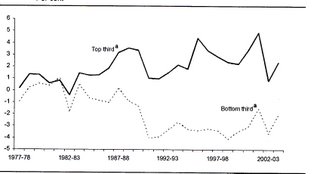Agrarian capitalism vs. John Howard

Howard's statement that:
it is part of the psyche of this country, it is part of the essence of
This is one in a long line of agrarian rhetoric from Australian politicians. But in the long run there seems no alternative. Increasing farm productivity means that fewer farmers are required to produce the same amount of output and demand for farm products does not increase along with income. In the long-run the drought is just a hiccup in this process. Western Victoria, and in particular the Mallee-Wimmera is now the heartland of commercial agriculture in Victoria with good land and land prices are kept down by the absence of alternative uses so farms can expand. But it is the wheat belt which is declining fastest in population and will continue to do so. When farmers can't sell (although blue-gum plantations provide a market) they might as well stay on the land but their children won't follow them and they end up as my students. On

0 Comments:
Post a Comment
<< Home